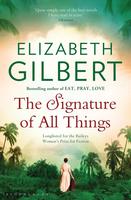 I don't get it. For some time now I’ve been working on a non-fiction book on the discoveries behind Charles Darwin and Alfred Russel Wallace’s theory of evolution. So I was intrigued to hear of a book - The Signature of All Things by Elizabeth Gilbert - which covered much of the same ground, but within the framework of historical fiction.
I don't get it. For some time now I’ve been working on a non-fiction book on the discoveries behind Charles Darwin and Alfred Russel Wallace’s theory of evolution. So I was intrigued to hear of a book - The Signature of All Things by Elizabeth Gilbert - which covered much of the same ground, but within the framework of historical fiction.
And as a novel, it was enjoyable enough. But it really didn’t get the scientific parts of my brain to tick.
I waited in vain for a eureka moment in the novel. Yet in the storied lives of Darwin and Wallace, there were several. Can we share, at the remove of the ever increasing years, the excitement of Darwin unearthing giant fossils at the beach of Punta Alta in Argentina? Or of his receipt of the divergent, yet intimately related Galapagos finches from John Gould, and the great light they swung over his forming theory? Or of Alfred Russel Wallace realizing that the colouration of sand beetles tracked the very colour of the substrate on which they live - dark on volcanic sand and light on chalky sand from sea-shells and corals?
I believe that we can. But the juicy bits to be found in The Signature of All Things tend to be more about the discovery of personal sexuality than about scientific theory. The scientific speciality of Alma - the main protagonist - is mosses. While one can perhaps excuse the author for not personally finding mosses the most exhilarating of biological subjects, I would have appreciated some kind of perspective on Alma's scientific endeavours. As an experiment in historical fiction, the book exhibits an impressive depth of research and reconstructive imagination. But having gone to the trouble of embedding the story at the heart of Victorian intellectual life, it seems a pity not to better illuminate the ideas supposedly drive Alma's spirit of scientific discovery.
So what I had envisaged as a cross-pollination of fiction and non-fiction turned out to be somewhat more traditional, albeit well-written. I am still waiting for that book that manages to be as exciting and easily read as a novel, while remaining scientifically inspiring. Maybe I will have to write it myself, after all.


 Follow us on Twitter
Follow us on Twitter Follow our Instagram
Follow our Instagram Our videos on YouTube
Our videos on YouTube

